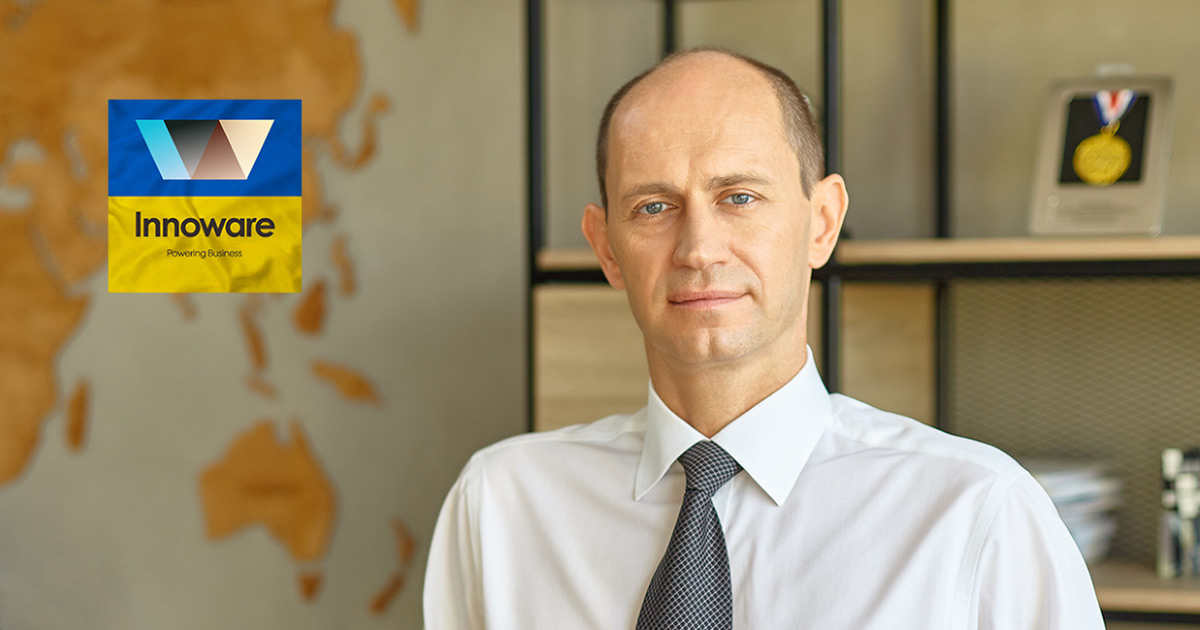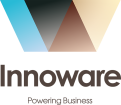21 years with Innoware. High quality consulting services and growth even in difficult times
In a new interview for Liga, founder and CEO Innoware, Dmytro Popinako talked about the most important achievements of the company over 21 years of work, what motivates him and his team now, as well as about the company's plans for the future.
In 2001, Dmytro Popinako, who previously worked at Robertson & Blums and Arthur Andersen, founded his own consulting company Innoware. The idea was to enable Ukrainian companies to fully use international solutions for managing business processes. At that time, all international solutions presented on the Ukrainian market had one common drawback — they could not be adjusted in such a way that they met the requirements of Ukrainian legislation.
Instead, Innoware found a software product that can be fully customized to work in Ukraine. Its manufacturer was the Danish company Navision. The Danish company was acquired by Microsoft the following year after Innoware struck a deal with it. So Innoware became a partner of Microsoft.
The main activity of the company is implementation and support services ERP systems (enterprise resource planning systems) from Microsoft, which allow you to support all business processes of the company: financial management, sales, production, logistics, operational activities, etc.
Over time, Innoware also expanded its activities in relation to CRM systems, which allow automating the entire chain of communications with customers. In addition, it offers services for companies to transition to cloud platforms.
Before the start of the full-scale war, about half of Innoware's revenue came from abroad, including from countries in Europe, North America, and the Middle East.
The founder and general director of the company, Dmytro Popinako, spoke about the most important achievements of the company over 21 years of work, what motivates him and his team now, as well as about the company's plans for the future.

Innoware turns 21 years old. If we were talking about a person, then at this age he or she has most likely already received a bachelor's degree, maybe continues to study at a university, or has the first professional achievements. At what stage is your company in this age?
It would be interesting to draw such an analogy. But a person grows and develops according to some laws, and companies - according to others. Companies develop unevenly - in a certain period very quickly, and then crises can occur, when companies roll back in their development. We have survived two crises. The first is the financial crisis of 2008-2009, and the second was caused by the pandemic and war that we are experiencing now. But crises are not only losses, but also new experiences from which we learn. The first crisis taught us to be financially stable. The second one teaches us to be resilient as individuals, as citizens and as professionals. But if we try to draw an analogy with a person, then we have gone much further than a bachelor's degree. Otherwise, we would not be able to enter the Western markets and successfully compete on them. Perhaps this is too ambitious, but I believe that we have a professor's degree on this scale.
What would you call the main achievement of your company during the entire period of its operation?
High quality of services. This is the most important evaluation criterion for any consulting company. From the point of view of our clients, this means that when they invest their funds in cooperation with us, the risk of losing them is much lower than if they invested them with someone else.
Let's return to the second crisis, that is, the war, which our entire country is currently experiencing. How exactly did it affect the work of the company, your employees and you personally?
As for me personally, I spent the first two weeks almost from the beginning of the full-scale war in the occupation. At the time of its beginning, I was in a country house located on the shore of the Kyiv Sea. On February 25, when there was a plan to leave there, Russian troops came in the morning and literally cut us off from the rest of Ukraine. We were without electricity for two weeks and mobile communication was very limited. In general, it was very difficult - instead of working with high technologies, I had to learn how to cook food on a fire and think about how not to freeze.
If we talk about the work of the company, then the crisis for us began with the beginning of the COVID-19 epidemic. If you had visited our office before, you would have seen how many people there are. We saw each other every day, exchanged information, held quick meetings if there was a need for them. The situation with the coronavirus has brought significant changes to our work. Now there are significantly fewer colleagues in the office, most of us work remotely. In this sense, the war did not bring too great changes to the company's work. People were both outside the office and stayed. Unless some of the employees now work from other countries.
After the start of the war, we did not stop providing services to our customers for a single minute. Although, in the first weeks, the reaction speed decreased somewhat, but this applied to almost all companies that found themselves in a difficult and completely unfamiliar situation and were forced to rebuild their business processes. Therefore, certain delays in the reaction were perceived by all parties as quite adequate and with understanding.
At this point, we have everything fixed and expect to be able to return to growth as a business organization in the near future.
Sounds really optimistic. What motivates you in times of war and do you know what motivates your employees?
We talked about it within the team. Like all people in Ukraine, we want our victory the most. We want the country to have a real European perspective and become one of the leaders of the democratic world. It is definitely important for us that all of us can determine ourselves and be masters of our own destiny. Therefore, today our team is working very hard to contribute to our future victory.
After the start of the war, you urged Ukrainian companies that use Russian-made ERP and CRM systems to abandon them in favor of international solutions. What exactly is your company doing to help make that transition for anyone who wants it?
In this direction, our efforts are focused on two main things. First, we work with a software manufacturer, Microsoft, to show them a new opportunity and a new market need that they can adapt their offering to. Our efforts are already successful, and Microsoft has recently offered Ukrainian companies its integrated enterprise management system Dynamics 365 Business Central at a discount of 80%. This has never happened before in any of the markets where Microsoft is present.
Secondly, we are working to make the transition from Russian systems to international ones easier for businesses. We are approached by auditing companies whose clients want to make such a transition, and together with them we look for ways to do it as efficiently as possible. In addition, we are working to make software change companies less likely to hire professional consultants like ours. In other words, let them do it for less.
Planning, especially in times of war, is difficult. But still, let's take a risk: what are the plans in Innoware for the coming year?
There are no secrets here. We will make every effort to help Ukrainian companies switch to international software products, which will allow them to be more efficient and competitive, because Ukrainian companies must enter the international arena with their products. In addition, Innoware will continue its development on the international market, because the demand for the services we offer is very high today in the world, especially in developed countries. Given the fact that Ukraine and everything Ukrainian is currently receiving a lot of attention in the world, we see great prospects in Western Europe and North America. And without a doubt, we will continue to develop our activities in our native Ukraine.
Innoware turns 21 years old. If we were talking about a person, then at this age he or she has most likely already received a bachelor's degree, maybe continues to study at a university, or has the first professional achievements. At what stage is your company in this age?
It would be interesting to draw such an analogy. But a person grows and develops according to some laws, and companies - according to others. Companies develop unevenly - in a certain period very quickly, and then crises can occur, when companies roll back in their development. We have survived two crises. The first is the financial crisis of 2008-2009, and the second was caused by the pandemic and war that we are experiencing now. But crises are not only losses, but also new experiences from which we learn. The first crisis taught us to be financially stable. The second one teaches us to be resilient as individuals, as citizens and as professionals. But if we try to draw an analogy with a person, then we have gone much further than a bachelor's degree. Otherwise, we would not be able to enter the Western markets and successfully compete on them. Perhaps this is too ambitious, but I believe that we have a professor's degree on this scale.
What would you call the main achievement of your company during the entire period of its operation?
High quality of services. This is the most important evaluation criterion for any consulting company. From the point of view of our clients, this means that when they invest their funds in cooperation with us, the risk of losing them is much lower than if they invested them with someone else.
Let's return to the second crisis, that is, the war, which our entire country is currently experiencing. How exactly did it affect the work of the company, your employees and you personally?
As for me personally, I spent the first two weeks almost from the beginning of the full-scale war in the occupation. At the time of its beginning, I was in a country house located on the shore of the Kyiv Sea. On February 25, when there was a plan to leave there, Russian troops came in the morning and literally cut us off from the rest of Ukraine. We were without electricity for two weeks and mobile communication was very limited. In general, it was very difficult - instead of working with high technologies, I had to learn how to cook food on a fire and think about how not to freeze.
If we talk about the work of the company, then the crisis for us began with the beginning of the COVID-19 epidemic. If you had visited our office before, you would have seen how many people there are. We saw each other every day, exchanged information, held quick meetings if there was a need for them. The situation with the coronavirus has brought significant changes to our work. Now there are significantly fewer colleagues in the office, most of us work remotely. In this sense, the war did not bring too great changes to the company's work. People were both outside the office and stayed. Unless some of the employees now work from other countries.
After the start of the war, we did not stop providing services to our customers for a single minute. Although, in the first weeks, the reaction speed decreased somewhat, but this applied to almost all companies that found themselves in a difficult and completely unfamiliar situation and were forced to rebuild their business processes. Therefore, certain delays in the reaction were perceived by all parties as quite adequate and with understanding.
At this point, we have everything fixed and expect to be able to return to growth as a business organization in the near future.
Sounds really optimistic. What motivates you in times of war and do you know what motivates your employees?
We talked about it within the team. Like all people in Ukraine, we want our victory the most. We want the country to have a real European perspective and become one of the leaders of the democratic world. It is definitely important for us that all of us can determine ourselves and be masters of our own destiny. Therefore, today our team is working very hard to contribute to our future victory.
After the start of the war, you urged Ukrainian companies that use Russian-made ERP and CRM systems to abandon them in favor of international solutions. What exactly is your company doing to help make that transition for anyone who wants it?
In this direction, our efforts are focused on two main things. First, we work with a software manufacturer, Microsoft, to show them a new opportunity and a new market need that they can adapt their offering to. Our efforts are already successful, and Microsoft has recently offered Ukrainian companies its integrated enterprise management system Dynamics 365 Business Central at a discount of 80%. This has never happened before in any of the markets where Microsoft is present.
Secondly, we are working to make the transition from Russian systems to international ones easier for businesses. We are approached by auditing companies whose clients want to make such a transition, and together with them we look for ways to do it as efficiently as possible. In addition, we are working to make software change companies less likely to hire professional consultants like ours. In other words, let them do it for less.
Planning, especially in times of war, is difficult. But still, let's take a risk: what are the plans in Innoware for the coming year?
There are no secrets here. We will make every effort to help Ukrainian companies switch to international software products, which will allow them to be more efficient and competitive, because Ukrainian companies must enter the international arena with their products. In addition, Innoware will continue its development on the international market, because the demand for the services we offer is very high today in the world, especially in developed countries. Given the fact that Ukraine and everything Ukrainian is currently receiving a lot of attention in the world, we see great prospects in Western Europe and North America. And without a doubt, we will continue to develop our activities in our native Ukraine.
Send a request
Package solutions:
IW Finance+
IW Trade
IW HR & Payroll
On our website, we use so-called cookies in accordance with Article 12 Clause 1 Clause 6 of the Personal Data Protection Act.
More details

